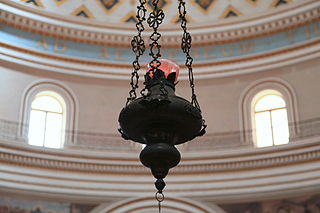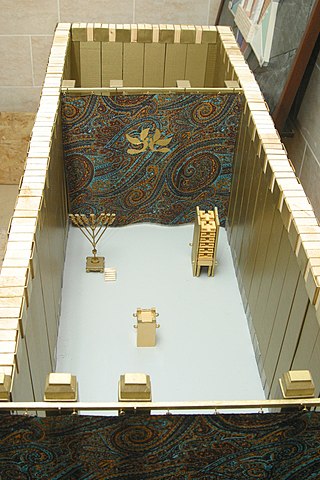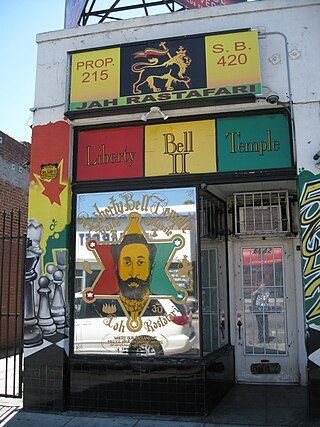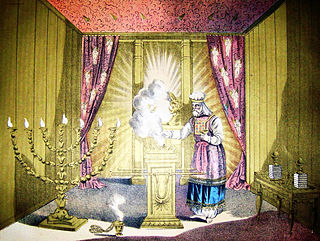
According to Abrahamic religions, Aaron was a Jewish prophet, a high priest, and the elder brother of Moses. Information about Aaron comes exclusively from religious texts, such as the Hebrew Bible, the New Testament, and the Quran.
The Book of Exodus is the second book of the Bible. It is a narrative of the Exodus, the origin myth of the Israelites leaving slavery in Biblical Egypt through the strength of their deity named Yahweh, who according to the story chose them as his people. The Israelites then journey with the legendary prophet Moses to Mount Sinai, where Yahweh gives the Ten Commandments and they enter into a covenant with Yahweh, who promises to make them a "holy nation, and a kingdom of priests" on condition of their faithfulness. He gives them their laws and instructions to build the Tabernacle, the means by which he will come from heaven and dwell with them and lead them in a holy war to conquer Canaan, which has earlier, according to the myth of Genesis, been promised to the "seed" of Abraham, the legendary patriarch of the Israelites.

According to the Hebrew Bible, the tabernacle, also known as the Tent of the Congregation, was the portable earthly dwelling of God used by the Israelites from the Exodus until the conquest of Canaan. Moses was instructed at Mount Sinai to construct and transport the tabernacle with the Israelites on their journey through the wilderness and their subsequent conquest of the Promised Land. After 440 years, Solomon's Temple in Jerusalem superseded it as the dwelling-place of God.

A sanctuary lamp, chancel lamp, altar lamp, everlasting light, or eternal flame is a light that shines before the altar of sanctuaries in many Jewish and Christian places of worship. Prescribed in Exodus 27:20-21 of the Torah, this icon has taken on different meanings in each of the religions that have adopted it. The passage, which refers to prescriptions for the tabernacle, states:
And thou shalt command the children of Israel, that they bring thee pure oil olive beaten for the light, to cause the lamp to burn always. In the tabernacle of the congregation without the veil, which is before the testimony, Aaron and his sons shall order it from evening to morning before the LORD: it shall be a statute for ever unto their generations on the behalf of the children of Israel. (KJV)
Roger Christie is an American ordained minister in the Religion of Jesus Church, which regards marijuana as a "sacramental herb." In 2000, he founded the THC Ministry, which offered cannabis as a part of its services. On July 8, 2010, Christie and 13 other individuals associated with the THC Ministry were indicted by a Federal grand jury in Honolulu on marijuana possession and trafficking charges. On Sept. 27, 2013, Christie pleaded guilty to marijuana trafficking and two counts of failing to file income tax returns. On April 28, 2014, Christie was sentenced to a term of five years in federal prison, with credit for time already served at the Honolulu Federal Detention Center.

The Holy of Holies is a term in the Hebrew Bible that refers to the inner sanctuary of the Tabernacle, where the Shekhinah appeared. According to Hebrew tradition, the area was defined by four pillars that held up the veil of the covering, under which the Ark of the Covenant was held above the floor. According to the Hebrew Bible, the Ark contained the Ten Commandments, which were given by God to Moses on Mount Sinai. The first Temple in Jerusalem, called Solomon's Temple, was said to have been built by King Solomon to keep the Ark.

The Law of Moses, also called the Mosaic Law, is the law said to have been revealed to Moses by God. The term primarily refers to the Torah or the first five books of the Hebrew Bible.
In the ancient Israelite religion, the holy anointing oil formed an integral part of the ordination of the priesthood and the High Priest as well as in the consecration of the articles of the Tabernacle and subsequent temples in Jerusalem. The primary purpose of anointing with the holy anointing oil was to sanctify, to set the anointed person or object apart as qodesh, or "holy".

Different religions have varying stances on the use of cannabis, historically and presently. In ancient history some religions used cannabis as an entheogen, particularly in the Indian subcontinent where the tradition continues on a more limited basis.
Sara Benetowa, later known as Sula Benet, was a Polish anthropologist of the 20th century who studied Polish and Judaic customs and traditions.
Many religions have expressed positions on what is acceptable to consume as a means of intoxication for spiritual, pleasure, or medicinal purposes. Psychoactive substances may also play a significant part in the development of religion and religious views as well as in rituals.
Hebrew Bible English translations are English translations of the Hebrew Bible (Tanakh) according to the Masoretic Text, in the traditional division and order of Torah, Nevi'im, and Ketuvim. Most Jewish translations appear in bilingual editions (Hebrew–English).

Terumah, Terumoh, Terimuh, or Trumah is the nineteenth weekly Torah portion in the annual Jewish cycle of Torah reading and the seventh in the Book of Exodus. The parashah tells of God's instructions to make the Tabernacle and its furnishings. The parashah constitutes Exodus 25:1–27:19. It is made up of 4,692 Hebrew letters, 1,145 Hebrew words, 96 verses, and 155 lines in a Torah Scroll. Jews in the Diaspora read it the nineteenth Sabbath after Simchat Torah, generally in February and rarely in early March.
Tetzaveh, Tetsaveh, T'tzaveh, or T'tzavveh is the 20th weekly Torah portion in the annual Jewish cycle of Torah reading and the eighth in the Book of Exodus. The parashah reports God's commands to bring olive oil for the lamp, make sacred garments for the priests, conduct an ordination ceremony, and make an incense altar.

Ki Tisa, Ki Tissa, Ki Thissa, or Ki Sisa is the 21st weekly Torah portion (parashah) in the annual Jewish cycle of Torah reading and the ninth in the Book of Exodus. The parashah tells of building the Tabernacle, the incident of the Golden calf, the request of Moses for God to reveal God's Attributes, and how Moses became radiant.

Vayakhel, Wayyaqhel, VaYakhel, Va-Yakhel, Vayak'hel, Vayak'heil, or Vayaqhel is the 22nd weekly Torah portion in the weekly Torah portion and the 10th of the Book of Exodus. The parashah tells of the making of the Tabernacle and its sacred vessels. It constitutes Exodus 35:1–38:20. The parashah is made up of 6181 Hebrew letters, 1,558 Hebrew words, 122 verses, and 211 lines in a Torah scroll.

Pekudei, Pekude, Pekudey, P'kude, or P'qude is the 23rd weekly Torah portion in the annual Jewish cycle of Torah reading. It is the 11th and last in the Book of Exodus. The parashah tells of the setting up of the Tabernacle.

In Judaism, the High Priest of Israel was the head of the Israelite priesthood. He played a unique role in the worship conducted in the Tabernacle and later in the Temple in Jerusalem, as well as in some non-ritual matters. Like all priests, he was required to be descended from Aaron. But unlike other priests, the high priest followed more restrictive laws, wore unique priestly garments, and was the only priest allowed to perform certain ceremonies.
The plant name cannabis is a Scythian word, which loaned into Persian as kanab, then into Greek as κάνναβις and subsequently into Latin as cannabis. The ancient Greeks learned of the use of cannabis by observing Scythian funerals, during which cannabis was consumed. In Akkadian, cannabis was known as qunubu (𐎯𐎫𐎠𐎭𐏂). The word was adopted in to the Hebrew language as qaneh bosem. The Germanic word that gives rise to English hemp may be an early Germanic loan from the same source.
In Judaism, there is debate that cannabis may have been used ritually in ancient Judaism, and the use of cannabis continues to be a controversial topic in modern Judaism.











